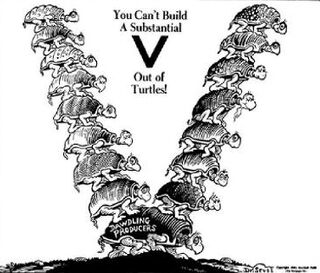Resilience
The Lessons We've Learned From Dr. Seuss's Works
He contributed to the development of a generous American sensibility.
Posted March 7, 2022 Reviewed by Michelle Quirk
Key points
- Children's books often reassure young listeners and help them learn generous values.
- The best children's books also entertain and edify adult readers.
- Seuss taught us lasting lessons about respect and resilience, decency and dignity, and liberty and loyalty.
Theodor Geisel, better known under his penname, Dr. Seuss, is best known for the catchy verse that accompanied the droll illustrations in his read-aloud children's books. But he is much less well known as an editorial cartoonist. Eight decades ago, however, during World War II, Geisel, a Captain in the U.S. Army, published more than 400 cartoons, many that carried patriotic messages to rally the home front in the war against fascism.

One of these drawings, from 1942, meant to spur on lagging war production, and it bore the caption “You Can’t Build a Substantial V Out of Turtles.” He assembled the “V” shape out of turtles piled precariously. At the bottom of the pile, he drew a large turtle plodding along, and labeled its shell with the message “Dawdling Producers.” The “V,” of course, stood for victory, an uncertain prospect early in the war.
A New Turtle
The original wartime cartoon presaged the main character in Yertle the Turtle, Seuss’s book that appeared 13 years after the war ended. The children’s book pictures Yertle, a grasping, domineering tower-builder, out to control all he could survey. But, in this later instance, Seuss inverted the scene, placing the dictatorial Yertle, who had been much irked with his perch on a low rock, high atop a growing number of burdened underlings. With the searing memory of Adolph Hitler and his horrifying depredations still fresh, Seuss offered adult readers an antiauthoritarian parable and his young listeners a lesson in just deserts. (Let’s not forget, the best children’s books reward both young and old.)
Still, Yertle the Turtle is a gentle tale, played out in witty tetrameter and playfully illustrated in Seuss’s signature style. Seuss said that kids could sniff out a moral a mile away, and so he kept the book funny, bringing the story and its villainous main character to a satisfying comeuppance. When the hard-pressed turtle on the bottom burps, (the word “burp” was daringly impolite in 1958), the tower of turtles wobbles and then collapses, and the bully, this time, plummets back into the swamp.
And today the great Yertle, that Marvelous he
Is King of the Mud. That is all he can see.
Rousing and Reassuring Messages
Yertle the Turtle was not the first of Dr. Seuss’s popular books that carried a rousing and reassuring message; nor was it the last. The Sneeches (1953) decried antisemitism and religious bigotry. Horton Hatches an Egg (1940) honored devotion and perseverance. A sequel, Horton Hears a Who (1954), commemorated individual freedom. The Cat in the Hat Comes Back (1958) venerated democracy. The Lorax (1970), warned of the modern dangers posed to the natural world.
Learning That Sticks
It's difficult to think of these issues as subversive now, but with books such as The Cat in the Hat (1957), Dr. Seuss did, in fact, aim to liberate children’s literature from the literalist and lackluster “Dick and Jane” and “See Spot Run” learning exercises that had dominated early literacy pedagogy. Over generations, the hundreds of millions of children who nestled in to hear Dr. Seuss’s yuzz-a-ma-tuzz reveled in the rhythm of language as they practiced invented vocabulary in the form of tongue twisters. Seuss’s verse is always a pleasant mouthful. But there was something else in Seuss’s books that is, perhaps, even more important: He contributed to the development of a generous American sensibility. Listening and reading his books, they (we!) learned and relearned lasting lessons about respect and resilience, decency and dignity, and liberty and loyalty.
A Timely Message
It was Audrey Geisel, Seuss’s widow, who teamed with the National Education Association (NEA) to create Read Across America Day, not coincidentally celebrated on Dr. Seuss’s birthday, March 2. And it was a staffer at NEA, Anita Merina, who penned the best advice for parents and grandparents in the form of a Seussian rhyme: “You are never too old, too wacky, too wild, to pick up a book and read to a child.” For this year’s event, my colleague Mark West, a scholar of children’s literature and professor of English at the University of North Carolina, Charlotte, offered a spirited and funny YouTube rendition of Yertle the Turtle. Listen through to the end and you’ll hear West’s brief commentary that is especially timely at this dark moment in the world’s history, when truth is on the run and when freedom is again literally under fire.
References
I-Huei Go, "How Dr. Seuss Changed Education in America," The New Yorker, (June 5, 2019)
Art Spiegleman, "Horton Hears a Heil" The New Yorker, (July 4, 1999)
Richard H. Minear, Dr. Seuss Goes to War, New York, New Press (1999)


